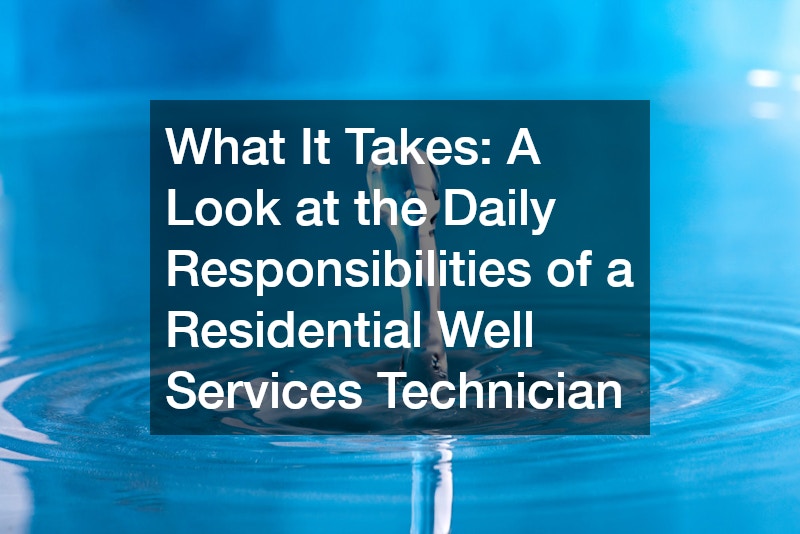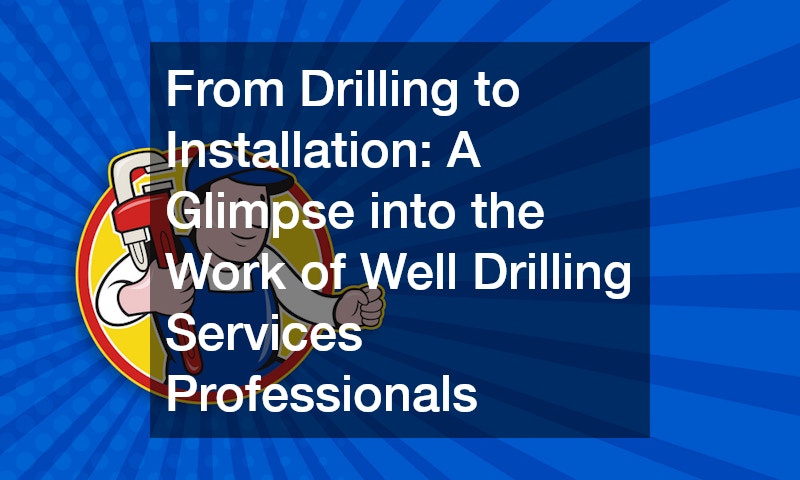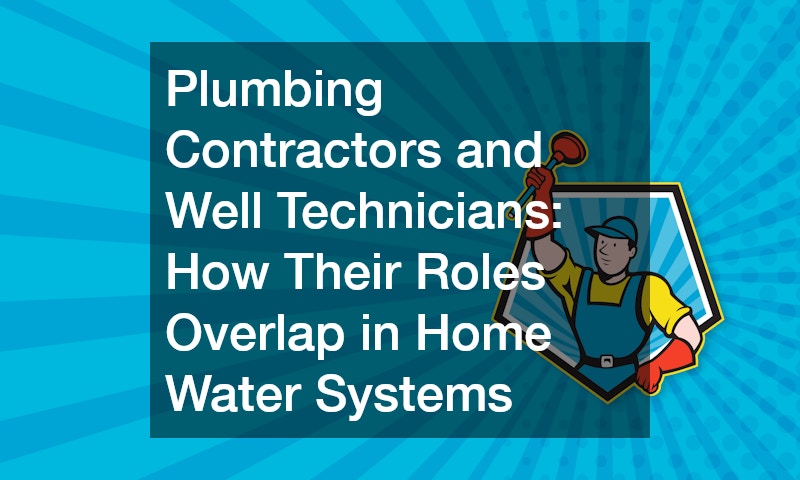Residential well drilling is a crucial service that provides homes with a stable and clean water supply. With this critical aspect of home infrastructure, the expertise of professionals in well services becomes essential. This article delves into the daily routines, responsibilities, and challenges faced by experts in the field of well drilling and pump installation.
Understanding the complexities of this industry can enrich our appreciation of the constant water flow we often take for granted. Residential well drilling involves a blend of technological expertise, mechanical skill, and physical endurance. From the intense process of drilling to the intricate mechanisms of pump installation, each step ensures that water reaches homes efficiently and safely.
Join us as we explore the insightful world of well drilling services, and share what it takes to ensure that water keeps flowing to households. This detailed examination reveals the inner workings of a well installing company and the vital roles played by these technicians. Here’s a comprehensive overview of what it’s like to work in this challenging yet rewarding field.
- Inside the Workday: How Well Pump Installations Are Handled by Experts
- What It Takes: A Look at the Daily Responsibilities of a Residential Well Services Technician
- From Drilling to Installation: A Glimpse into the Work of Well Drilling Services Professionals
- Behind the Scenes: A Day in the Life of a Well Installing Company Technician
- Plumbing Contractors and Well Technicians: How Their Roles Overlap in Home Water Systems
- The Essential Tasks of Local Pump and Well Services Technicians: A Typical Day
- Sump Pump Repair and Installation: What It’s Like for a Professional Technician
- Managing Water Pressure: A Day in the Life of a Water Pressure Tank Specialist
- How Water Well Pumps Are Installed: A Close Look at the Day-to-Day Work of Well Drilling Experts
- On the Job: Plumbing Contractors’ Role in Maintaining Water Wells and Well Pumps
- What It Takes to Maintain and Install Water Wells: Insights from Industry Experts
- The Challenges and Rewards of Working in Well Services and Plumbing
- A Professional’s Guide to the Day-to-Day Operations of Well Drilling and Pump Installation
Inside the Workday: How Well Pump Installations Are Handled by Experts
The installation of well pumps requires precision, skill, and a deep understanding of both the technology and the environment. Well pump installation is typically performed by highly trained technicians who understand the intricacies of various pumping systems. They must consider factors like well depth, water yield, and geologic formations to ensure optimal functioning.
Before the installation begins, technicians assess the site thoroughly to determine the most appropriate equipment and methods. This includes understanding the specific needs of the locale, such as municipal regulations or unique geological conditions. The success of a well pump installation depends largely on this preparatory work and the adaptability of the crew.
These experts also provide maintenance and repairs, ensuring that residential water systems continue functioning without interruptions. Their day often involves a mix of hands-on technical work and customer service, explaining processes to homeowners and advising on best practices. The role is as much about problem-solving as it is about installation.
What It Takes: A Look at the Daily Responsibilities of a Residential Well Services Technician

A residential well services technician has a diverse array of daily responsibilities that extend beyond mere installations. Their work begins with planning and scheduling service calls, often responding to urgent requests for sump pump repair or well maintenance. Each task requires careful attention to detail and the ability to troubleshoot complex issues swiftly.
During site visits, these technicians often perform inspections to ensure wells and pumps are operating efficiently. They assess equipment for signs of wear and tear, test water pressure, and make necessary adjustments or repairs to water pressure tanks. Their role is crucial in preventing potential breakdowns and ensuring clients have reliable access to water.
In addition to their technical duties, well services technicians often engage in community outreach and education. They may advise homeowners on conservation practices or how to maintain their well systems. This aspect of their role is vital in fostering awareness and trust between the technicians and the communities they serve.
From Drilling to Installation: A Glimpse into the Work of Well Drilling Services Professionals

Well drilling services professionals are the cornerstone of water supply infrastructure, ensuring that water wells function optimally. Their work begins with surveying and analyzing potential drilling sites, where they consider geological data and water tables. This groundwork informs their approach and helps mitigate risks during the drilling process.
The drilling phase requires state-of-the-art equipment and precision, as it involves creating deep boreholes into the earth to access water sources. This complex task demands both technical skill and a deep understanding of the earth’s geology. Professionals in this field often collaborate closely with geological experts to ensure successful outcomes.
Once the drilling is complete, the installation of well pump systems takes precedence. Well drilling services professionals often transition into installation roles, ensuring the smooth integration of pumping systems. This seamless handover is crucial for the sustainability and longevity of water wells, highlighting the technicians’ versatility and expertise.
Behind the Scenes: A Day in the Life of a Well Installing Company Technician
The daily activities of a technician at a well installing company are both varied and demanding. Each day begins with a review of upcoming projects, logistical planning, and sometimes unexpected challenges. These technicians must coordinate with clients, team members, and supply chains to ensure seamless operations.
Throughout the day, they tackle numerous tasks such as assembling and disassembling pump systems, adjusting water pressure tanks, and conducting onsite assessments. Their work is a combination of physical labor, technical precision, and customer interaction. Each task requires problem-solving skills and the ability to work in different environmental conditions.
Communication and teamwork are essential components of a technician’s day. Collaborating with plumbing contractors and other technicians is often necessary, especially on complex projects that require diverse expertise. This collaborative spirit ensures that projects are completed efficiently and to the highest standards.
Plumbing Contractors and Well Technicians: How Their Roles Overlap in Home Water Systems

Plumbing contractors and well technicians often collaborate to ensure the seamless operation of residential water systems. Their roles overlap significantly because they both work towards providing reliable water supply and ensuring water quality. Plumbing contractors handle the broader aspects of home plumbing, while well technicians focus on the systems that bring water into the home.
Their collaboration is especially crucial in scenarios involving upgrades or repairs to existing water systems. For instance, plumbing contractors might install new piping systems, while well technicians ensure the water well pumps are functioning correctly. Together, they can efficiently address water pressure issues and enhance overall system performance.
This partnership becomes even more critical during emergencies such as water leaks or pump failures. Swift, coordinated action by both plumbing contractors and well technicians can mitigate damage and restore service quickly. Their synergy highlights the interdependent nature of home water system maintenance and the importance of cross-disciplinary expertise.
The Essential Tasks of Local Pump and Well Services Technicians: A Typical Day

Local pump and well services technicians start their day by reviewing their project schedules, often balancing multiple service calls across different locations. They typically perform various tasks including inspections, maintenance, and well pump installation. These essential services ensure consistent and efficient water flow in households.
Technicians must be adept at diagnosing issues quickly and efficiently, requiring keen observation skills and a comprehensive understanding of water systems. They might troubleshoot problems such as low water pressure, pump malfunction, or contamination concerns. Every day brings new challenges, making flexibility and adaptability crucial traits in this profession.
Regular interaction with clients is also a vital part of their daily routine, providing guidance on maintenance practices and answering inquiries about water systems. This aspect of their role helps build strong relationships and trust with the community, reinforcing their position as pivotal figures in local infrastructure support.
Sump Pump Repair and Installation: What It’s Like for a Professional Technician
Professional technicians dealing with sump pump repair and installation perform vital tasks to prevent basement flooding and manage groundwater. Their work is imperative for homeowners who rely on sump pumps to protect their properties during heavy rainfall. They conduct regular inspections to ensure that these systems are functioning correctly and make repairs where necessary.
The installation process involves meticulous planning and setup, requiring an understanding of the home’s foundation and drainage patterns. Technicians must customize the installation to accommodate the specific needs of each property, ensuring that the sump pump provides adequate protection. This process can include installing backup batteries or alarms for added security.
Dealing with sump pumps also involves educating clients about maintenance protocols and potential warning signs of failure. Providing this information empowers homeowners to manage minor issues themselves and know when to call in the professionals. Such proactive measures are essential for maintaining system effectiveness and longevity.
Managing Water Pressure: A Day in the Life of a Water Pressure Tank Specialist
Water pressure tank specialists focus primarily on balancing and maintaining optimal water pressure within residential systems. They play a crucial role in ensuring that water wells deliver consistent pressure, allowing for a reliable water supply to household appliances and fixtures. Their day typically involves checking system pressures, adjusting settings, and resolving pressure-related issues.
These specialists often find themselves responding to homeowners’ complaints regarding uneven water pressure or insufficient supply. Diagnosing and fixing these problems requires a thorough knowledge of both water systems and the equipment used to regulate pressure. Their expertise ensures that water delivery remains steady, preventing issues that could lead to water waste or damage.
Additionally, water pressure tank specialists might recommend equipment upgrades or maintenance routines to improve overall system performance. By optimizing the function of water pressure tanks, these professionals directly contribute to the efficiency and functionality of a home’s water system. Their insights and recommendations can have lasting impacts on water conservation and household resource management.
How Water Well Pumps Are Installed: A Close Look at the Day-to-Day Work of Well Drilling Experts
Installing water well pumps involves meticulous planning and execution by well drilling experts to ensure reliable water delivery. These professionals assess various factors such as geological conditions, well depth, and system requirements before initiating an installation. The process includes selecting the appropriate pump type and configuring it for optimal performance.
During the installation, well drilling experts must carefully handle equipment to prevent damage to the well structure and surrounding environment. Precision is key, as improper installation can lead to inefficiencies or premature failures in the pump system. Their experience and expertise guide them in making precise adjustments and fine-tuning the pump’s operation.
After the installation, maintenance responsibilities are crucial to ensure the longevity of the water well pump. Technicians perform routine checks and address any arising issues promptly to minimize disruptions. This proactive approach to maintenance is an essential aspect of well drilling services, highlighting the technicians’ commitment to excellence.
On the Job: Plumbing Contractors’ Role in Maintaining Water Wells and Well Pumps
Plumbing contractors often find themselves involved in the maintenance and repair of water wells and well pumps. Their role complements that of well services technicians, as they bring expertise in system connectivity and residential plumbing infrastructure. This collaboration ensures holistic care for homeowners’ water systems.
Maintenance tasks often involve inspecting and repairing the connections between the residential plumbing network and the well system. Plumbing contractors may install new piping, update existing water lines, or upgrade components to optimize system efficiency. Their expertise is vital in ensuring that all parts from the well to the faucet work cohesively.
In emergency situations, plumbing contractors provide swift and effective solutions, often working closely with well services technicians to diagnose and resolve issues. Their ability to adapt to evolving circumstances and provide prompt service is crucial in maintaining homeowner satisfaction and system reliability.
What It Takes to Maintain and Install Water Wells: Insights from Industry Experts
The maintenance and installation of water wells demand a profound understanding of geology, hydrology, and technology. Industry experts emphasize the importance of regular inspections and proactive maintenance to prevent unexpected disruptions. Their insights highlight the specialized knowledge required in this meticulous and technical field.
Installation involves assessing geological conditions and selecting suitable equipment, balancing factors such as depth, capacity, and longevity. Proper installation is crucial as it lays the foundation for a well’s efficient functioning and long-term performance. Industry experts rely on their experience and training to make informed decisions throughout the process.
Maintenance strategies are equally vital, as they extend the life of a water well and enhance its efficiency. This ongoing care involves monitoring water quality, testing system components, and making necessary adjustments. Professionals in residential well drilling understand that diligent maintenance is key to providing reliable water access to homeowners.
The Challenges and Rewards of Working in Well Services and Plumbing
The fields of well services and plumbing present a series of unique challenges and rewards for those who pursue a career in this industry. Among the challenges are adapting to technological advancements, dealing with environmental factors, and ensuring compliance with evolving regulations. Despite these demands, the work is deeply rewarding as it directly influences the quality of life for homeowners.
Professionals in this field enjoy the satisfaction of solving complex problems and providing essential services that are critical to daily living. Each successful project reinforces their expertise and positively impacts the community. The ability to offer reliable water access and maintain home infrastructures drives many technicians’ commitment to excellence.
Furthermore, the industry offers opportunities for growth and continuous learning. As technology evolves, so do the methods and tools available for residential well drilling and plumbing. These advancements present exciting opportunities for professionals to expand their skills and enhance their service offerings, making the work as rewarding as it is essential.
A Professional’s Guide to the Day-to-Day Operations of Well Drilling and Pump Installation
The day-to-day operations in well drilling and pump installation are characterized by a blend of preparation, execution, and adaptation. Professionals start each day by assessing their schedules, coordinating with their teams, and preparing their equipment for the tasks ahead. This groundwork is crucial for the smooth progression of operations throughout the day.
Fieldwork typically involves site assessments, pump installations, and troubleshooting existing systems. Each task requires precise attention to detail and comprehensive knowledge of water well systems. Technicians must navigate a range of environments and conditions, displaying versatility and technical acumen.
Adaptability is a must, as unexpected challenges are common in this line of work. Whether addressing an unforeseen equipment failure or adjusting plans based on weather conditions, well drilling professionals must be prepared to evolve with the situation. This dynamic environment fosters continuous learning and drives innovation in practice.
The world of residential well drilling is intricate, challenging, and essential to modern living. It encompasses a range of activities from detailed site assessments to sophisticated installations and ongoing maintenance. Professionals in this field provide vital services that ensure our homes have access to a reliable and sustainable water supply.
The dedication and expertise of well services technicians, plumbing contractors, and all associated professionals make continuity of water supply possible. Their work is underpinned by a commitment to excellence and a drive to overcome challenges, reflecting the true spirit of innovation and problem-solving.
As our understanding of natural resources and technology continues to evolve, so too will the practices within this field. Residential well drilling and related services will remain at the forefront of providing essential services, ensuring that water continues to flow through our homes efficiently and effectively.
